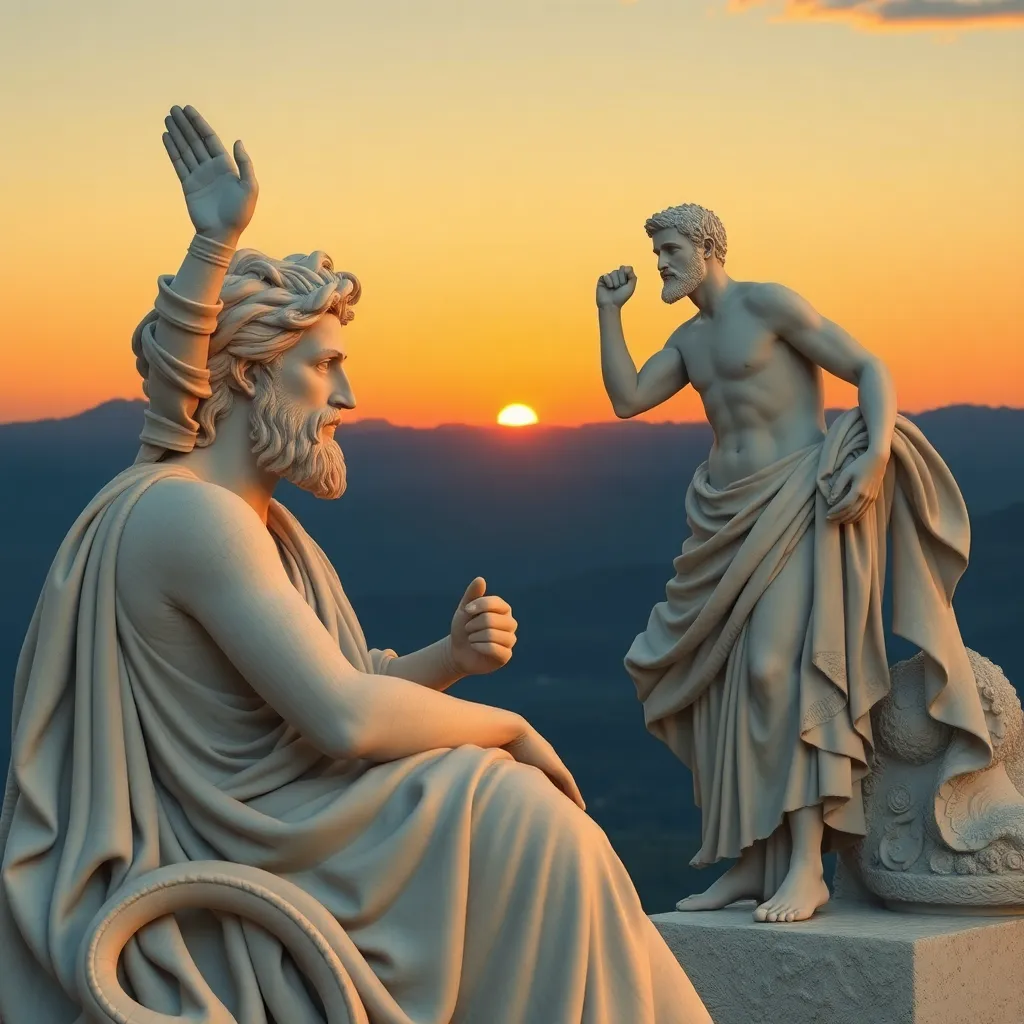The Relationship Between Apollo and Aesculapius: Healing and Medicine
I. Introduction
In the rich tapestry of Greek mythology, Apollo and Aesculapius stand out as figures intimately associated with healing and medicine. Apollo, the god of prophecy, music, and healing, serves as a vital link between the divine and the practice of medicine. Meanwhile, Aesculapius, his son, embodies the art of healing itself. The ancient Greeks placed great importance on health and wellness, viewing healing as both a physical and spiritual pursuit. This article explores the intricate relationship between Apollo and Aesculapius, shedding light on their mythological origins, mentorship, and the lasting impact they have had on the field of medicine.
II. The Mythological Origins of Apollo
Apollo, one of the Twelve Olympian gods, is renowned for his multifaceted nature. He is often celebrated as the god of prophecy, music, poetry, and healing. His dual role as a bringer of both plague and healing highlights the complexity of his character. Apollo’s healing aspect is particularly significant, as he embodies the balance between life and death.
In the Greek pantheon, Apollo is not only associated with the arts but also plays a crucial role in medicine. He is believed to have imparted knowledge of healing arts to mortals, establishing a connection between divine inspiration and human practice. Symbolically, the laurel tree, sacred to Apollo, represents victory and healing, further emphasizing his role in the wellness of both individuals and communities.
III. Aesculapius: The God of Medicine
Aesculapius, the son of Apollo and the mortal woman Coronis, is revered as the god of medicine and healing. His birth is steeped in mythology, showcasing the divine lineage from which he descended. Aesculapius inherited his father’s skills and knowledge, becoming a formidable healer in his own right.
Several attributes and symbols are closely associated with Aesculapius, most notably the Rod of Asclepius, a staff entwined with a serpent. This symbol has become a universal emblem of medicine and healing. Aesculapius’s contributions to the practice of medicine were groundbreaking; he is credited with teaching the principles of healing, surgery, and the importance of compassion in patient care.
IV. The Mentor-Student Relationship
The relationship between Apollo and Aesculapius is characterized by a deep mentor-student dynamic. As a father, Apollo played a pivotal role in shaping Aesculapius’s understanding of healing practices. He imparted crucial lessons, emphasizing the importance of ethical considerations and the need for a holistic approach to medicine.
Apollo’s teachings encompassed various aspects of healing, including:
- Understanding the human body and its ailments
- The significance of diet and lifestyle in maintaining health
- The necessity of empathy and compassion in patient care
This divine guidance ultimately paved the way for Aesculapius to transition from a mythological figure to an influential force in human medicine, establishing practices that would resonate through the ages.
V. Healing Practices and Sacred Sites
The healing practices associated with Aesculapius were often conducted in sacred sites known as Asclepius temples. These temples served as sanctuaries for the ill and were regarded as places where divine intervention could lead to healing. Key temples included those at Epidaurus and Kos, which became pilgrimage sites for those seeking cures.
Rituals associated with Aesculapius’s healing cult were elaborate and often involved:
- Offerings and sacrifices to the god
- Dream incubation, where patients would seek divine guidance through dreams
- Ritual purification practices
Apollo’s role in these sacred healing sites was significant; he was often invoked alongside Aesculapius, reinforcing the connection between divine will and the healing arts. The presence of both gods underscored the belief that healing was not solely a medical practice but a spiritual journey.
VI. Symbolism and Iconography
The artistic representations of Apollo and Aesculapius reveal much about their roles in healing and medicine. Apollo is frequently depicted with a lyre, symbolizing harmony and the arts, while Aesculapius is often shown with his serpent-entwined staff, representing wisdom and the transformative power of healing.
Key symbols associated with their iconography include:
- The Lyre: Reflecting Apollo’s connection to music and the arts, which were believed to heal the soul.
- The Serpent: A symbol of renewal and healing, often associated with Aesculapius, representing the duality of life and death.
These symbols not only highlight their individual attributes but also reflect the intertwined nature of music, art, and healing in ancient Greek culture.
VII. Legacy and Influence on Modern Medicine
The impact of Apollo and Aesculapius on contemporary medical practices is profound. Their mythological narratives have laid the foundation for many modern concepts in healthcare. The principles of holistic healing, patient empathy, and the recognition of the mind-body connection can be traced back to their teachings.
In modern healthcare, references to Apollo and Aesculapius appear in various forms, such as:
- The Rod of Asclepius, still used as a symbol for healthcare organizations.
- Mentorship and training models in medical education, echoing Apollo’s role as a teacher.
- Holistic approaches to patient care that emphasize physical, emotional, and spiritual well-being.
As society continues to evolve, the lessons imparted by Apollo and Aesculapius remain relevant, reminding us of the importance of compassion and understanding in the healing process.
VIII. Conclusion
The relationship between Apollo and Aesculapius is a fascinating exploration of the intersection of divine influence and human medicine. Their legacies continue to inspire and guide modern practices, reflecting the enduring nature of healing as a divine gift. As we delve into the mythology surrounding these two figures, we find valuable insights into the nature of health, wellness, and the profound connection between the arts and healing. Understanding their stories enriches our appreciation for the heritage of medicine and the ongoing quest for holistic healing in our lives.




